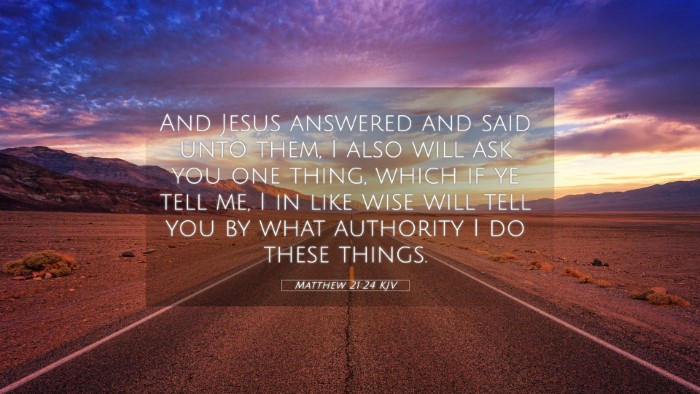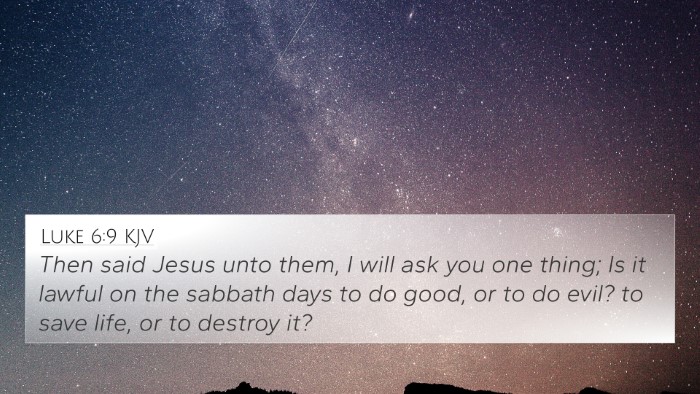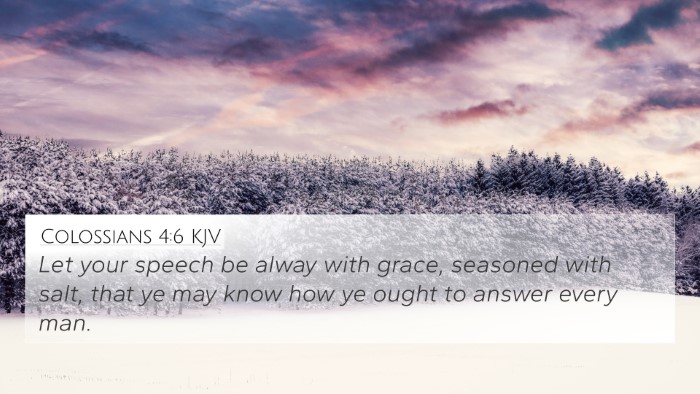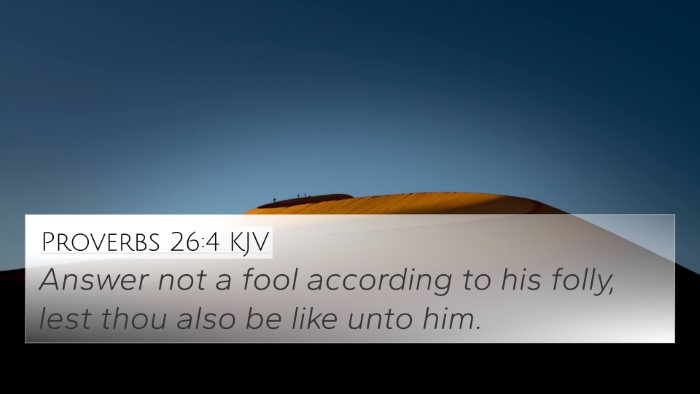Understanding Matthew 21:24
Verse: "And Jesus answered and said to them, ‘I also will ask you one thing, which if you tell me, I likewise will tell you by what authority I do these things.’"
Contextual Overview
In Matthew 21:24, we see Jesus responding to the religious leaders' questioning about His authority. This moment is pivotal as it highlights the confrontation between Jesus and the established religious order of His time. The preceding context involves Jesus' triumphal entry into Jerusalem and His cleansing of the temple, actions that challenged the status quo.
Commentary Insights
-
Matthew Henry:
Henry notes that this question posed to Jesus was intended to trap Him. By turning the question back on His accusers, Jesus demonstrates wisdom and authority. His method of inquiry encourages self-reflection among the religious leaders, prompting them to consider their own inability to answer straightforward questions about their faith.
-
Albert Barnes:
Barnes emphasizes that Jesus’ response indicates His authority comes from God rather than human institutions. By asking the religious leaders to answer Him, He challenges their understanding of authority and invites them to acknowledge the divine source of His works. This dialogue reveals the tension between earthly authority and divine will.
-
Adam Clarke:
Clarke interprets Jesus’ words as a masterstroke of argumentation. He points out that Jesus places the ball back in the court of the religious leaders, forcing them into a dilemma. They cannot openly affirm His divine authority without implicating themselves, and they cannot deny it without risking the disapproval of the people.
Interpretation of the Verse
Matthew 21:24 serves as a profound reminder of the nature of authority. Jesus doesn’t just assert His authority; He invites discussion and critical thought, revealing the deficiencies in the leaders' understanding of divine authority. This interaction sets the stage for further teaching and parables from Jesus, illustrating the continual theme of the kingdom of God challenging human institutions.
Connections Between Bible Verses
This verse invites an array of cross-references and connections to other scriptures that echo similar themes:
-
Matthew 21:25-26: The subsequent verses elaborate further on the authority question, establishing the inability of the chief priests to answer Jesus, which highlights their spiritual blindness.
-
Mark 11:29-30: A parallel account that reflects the same argumentative exchange, emphasizing Jesus’ cleverness in avoiding a trap through counter-questioning.
-
Luke 20:2-3: Another parallel, demonstrating the escalating tensions between Jesus and the Jewish authorities, underscoring the theme of questioning authority.
-
John 5:27: This verse speaks to Jesus’ authority to execute judgment, linking His claim in Matthew 21:24 to His divine role and mission.
-
Matthew 7:29: Where the people recognize Jesus’ teaching as authoritative, providing a contrast to the skepticism of the religious leaders in 21:24.
-
Acts 4:7: The apostles are also questioned about their authority, a direct connection to the ongoing theme of divine authority versus human traditions.
-
1 Corinthians 1:21: Paul discusses the wisdom of God as folly to the world, linking the theme of divine revelation and authority to the world’s understanding.
Thematic Bible Verse Connections
Throughout scripture, there is a rich tapestry of themes related to authority and wisdom. The following thematic connections arise from Matthew 21:24:
- Divine vs. Human Authority
- The Role of Questions in Teaching
- Spiritual Blindness and Recognition
- The Conflict of Kingdom Values vs. Earthly Values
- Jesus as the True Source of Authority
Applying the Verse Today
Matthew 21:24 invites modern believers to reflect on the sources of authority in their lives. Are we guided by divine wisdom, or do we adhere to human institutions that may misguide us? In a world filled with various claims to authority, the faithful must discern between God’s truth and human tradition.
Cross-Referencing Biblical Texts
The study of inter-Biblical dialogue through cross-referencing allows believers to deepen their understanding of scripture. Tools for Bible cross-referencing, such as a Bible concordance or a cross-reference Bible study guide, can greatly assist in this endeavor.
Cross-Referencing Bible Study Tools
- Bible Concordance: A key tool for finding connections among verses.
- Cross-Reference Bible Study: Methodologies for linking biblical texts thematically.
- Bible Reference Resources: Materials for deeper dives into scriptural themes.
Conclusion
The inquiry regarding Jesus’ authority encapsulated in Matthew 21:24 serves not only to challenge the religious leaders of His day but also invites ongoing reflection and understanding in contemporary faith practice. Through careful study, reflection, and cross-referencing of the scriptures, we can better appreciate the complexities and rich teachings found in the Bible.






